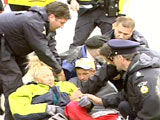
Bagnell Inquest adjourned amid controversy
September 14, 2006 in News
Coroner Stephen Fonseca today adjourned the coroner’s inquest into the death of Robert Bagnell and ordered a ban on publication or distribution of a letter dated September 14, 2005 from Victoria Chief Constable Paul Battershill to B.C. Police Complaint Commissioner Dirk Ryneveld and Vancouver Chief Constable Jamie Graham.
Yesterday, the coroner’s jury heard that the two Tasers used on Bagnell were tested by electrical lab Intertek ETL Semko and that one of them generated 30.42 joules/pulse of energy in conditions designed to simulate contact with human skin. This is 84.5 times greater than the manufacturer’s specification of 0.36 joules/pulse. The author of the report was scheduled to testify today.
Robert Bagnell died June 23, 2004. On June 25, 2004, VPD Detective Faora advised his mother that he died of a drug overdose. On July 23, 2004, after the body had been cremated and the ashes delivered to the family, the VPD issued a media release advising the public that the death had occurred in police custody and that Bagnell had been “Tasered” before he died. On August 16, 2004, VPD Deputy Chief LePard issued a follow-up media release stating that the Taser was used to rescue Bagnell from a fire in the building.
Tasers are a controversial prohibited weapon that “overwhelm the central nervous system” with 50,000 volts of electricity, according to the manufacturer, Taser International Inc. They have been linked to the deaths of at least 215 people in Canada and the U.S. Tasers were introduced to Canada by the Victoria Police Department’s Darren Laur, who was the recipient of cash payments and stock options from Taser International.
No comprehensive independent Canadian safety testing has ever been done on these high-voltage electrical devices. Jason Doan of Calgary, who died on August 30, 2006, was at least the 14th Canadian to die after being shocked by a police Taser.
….
Coroners’ inquests:
The Coroners Service of British Columbia is part of the Ministry of Public Safety and Solicitor General, the ministry responsible for policing within the province. The Chief Coroner is Terry Smith, formerly of the RCMP. According to the Coroners Service’s website; “An inquest is a formal court proceeding that allows for the public presentation of all evidence relating to a death. Inquests may be held to focus community attention on a death and to satisfy the community that the death of one of its members is not overlooked, concealed or ignored. An inquest is mandatory when a death occurs in police custody.”
posted by Cameron Ward
Bagnell inquest continues
September 7, 2006 in News
The five man jury at the coroner’s inquest into the death of Robert Bagnell has heard that VPD homicide investigators did not interview any of the 12 VPD members who were at the scene when Bagnell died. Instead, after “decompressing”, the police officers submitted brief written accounts later. The four ERT members who were in physical contact with Bagnell when he stopped breathing delivered their statements to investigators on July 9, 2004, seventeen days after the incident.
The deceased’s mother Riki Bagnell testified that she learned Tasers had been used on her son about a month after his death, from TV news accounts. She said she asked the investigator why the police didn’t just leave her son alone to calm down and his response was “That’s a good question, Mrs. Bagnell”. A few weeks later the VPD held a news conference to explain they Tasered Bagnell to rescue him from a fire in the building.
The VPD media accounts of the death are archived at www.vancouver.ca.
The Province of British Columbia allows police departments to investigate their own members in cases of serious injury and death despite recommendations of a coroner’s jury in January 2004 that such investigations be done independently.
posted by Cameron Ward
Betty Krawczyk denied trial by jury
August 2, 2006 in News
On August 24, 2006, Madam Justice Brown dismissed Betty Krawzcyk’s application for a jury trial, rejecting submissions that she has a constitutional right to such a trial under the Charter of Rights and Freedoms.
Betty Krawczyk, a 78 year old great-grandmother, faces a trial on September 15, 2006 on allegations that she is in crimnal contempt of court for disobeying an interim injunction order made in a civil case commenced by two corporations against Dennis Perry and Bruce McArthur. Perry and McArthur are two West Vancouver residents who were distressed by the BC government’s plan to construct a four lane highway through a sensitive and unique ecosystem known as “Eagleridge Bluffs”, rather than using a more environmentally-friendly alternative.
Betty was arrested after repeatedly putting herself in the path of excavation equipment to symbolically protest the provincial government’s decision to destroy the Eagleridge Bluffs. She has not been arrested or charged under the Criminal Code. Rather, she is the subject of a widespread BC practice, sometimes called “government by injunction”, whereby companies file a civil lawsuit and then prevail on the courts to issue a temporary injunction order to preserve the status quo. This is the technique used by MacMillan Bloedel in the notorious Clayoquot Sound case, where almost 900 people were arrested, tried, convicted and jailed for criminal contempt of court. The civil lawsuit that triggered the arrests was later dismissed for want of prosecution.
…..
Here are some learned comments on the practice of “government by injunction”:
“Government by injunction is a thing abhorrent to the laws of England and this province.”
Middleton J.A., Ontario Court of Appeal, 1924
“Having obtained an injunction in protection of a private right, the plaintiff seeks to turn it into a public criminal prohibition against the whole community, on the ground that there would be otherwise a flouting of the due course of justice. Can it be doubted that the proposition carries its own condemnation? It is indeed an ingenious argument for securing the aid of the criminal powers of the equity court against any persons whom the court can be induced to regard as having affronted its dignity or having interfered with the due performance of its functions.” Bora Laskin, 1937, Canadian Bar Review
“This has been a maliciously effective, pseudo-legal way of breaking the back of legitimate moral process.” Martin Luther King, Jr., 1963, commenting on the injunction and contempt charge that landed him in the Birminingham Jail.
“There is today the grave question of whether public order should be maintained by the granting of an injunction, which often leads thereafter to an application to commit for contempt or should be maintained by the Attorney General insisting that the police who are under his control do their duty by enforcing the relevant provisions of the Criminal Code” Southin J.A., 1990, BC Court of Appeal, Everywoman’s case
[This is], in essence, a request for the court to craft a proscriptive law binding on all citizens respecting certain activities. It is not the assertion of a civil claim at all, but the adaptation of the mechanics of a civil claim for the purpose of legislating, by way of injunction, a form of ad hoc criminal law…I think this proceeding amounts to a kind of officially induced abuse of process.”, McEwan J., 2003, BC Supreme Court
posted by Cameron Ward
Government by injunction: an abuse of the court's process
July 9, 2006 in News
On July 7, 2006, a BC Supreme Court judge ordered that Betty Krawczyk, 77, be held in jail until September 15, 2006. That is the date of her “trial” on allegations that she breached a court injunction order in a civil action commenced by the companies constructing the Sea to Sky Highway improvements against Dennis Perry and Bruce MacArthur. Betty is not a party in that case.
Betty was arrested after repeatedly pitching a small tent in the path of excavation equipment to protest the government’s decision to destroy a unique and sensitive ecosystem known as Eagleridge Bluffs.
Here are some learned comments on the practice of “government by injunction”:
…………
“Government by injunction is a thing abhorrent to the laws of England and this province.”
Ontario Court of Appeal
“Having obtained an injunction in protection of a private right, the plaintiff seeks to turn it into a public criminal prohibition against the whole community, on the ground that there would be otherwise a flouting of the due course of justice. Can it be doubted that the proposition carries its own condemnation? It is indeed an ingenious argument for securing the aid of the criminal powers of the equity court against any persons whom the court can be induced to regard as having affronted its dignity or having interfered with the due performance of its functions.” Bora Laskin, 1937, Canadian Bar Review
“This has been a maliciously effective, pseudo-legal way of breaking the back of legitimate moral process.” Martin Luther King, Jr., 1963, commenting on the injunction that landed him in the Birminingham Jail.
“There is today the grave question of whether public order should be maintained by the granting of an injunction…” Southin J.A., 1990, Everywoman’s case, BC Court of Appeal
[This is], in essence, a request for the court to craft a proscriptive law binding on all citizens respecting certain activities. It is not the assertion of a civil claim at all, but the adaptation of the mechanics of a civil claim for the purpose of legislating, by way of injunction, a form of ad hoc criminal law…I think this proceeding amounts to a kind of officially induced abuse of process.”, McEwan J., 2003, BC Supreme Court

Why bother with laws at all, when companies and governments can employ injunctions to arrest people? Let’s identify bothersome activities and have a judge enjoin John Doe, Jane Doe and everyone else from engaging in them. Let’s then authorize the police to enforce the injunctions by arrest, then have the judges convict people of criminal contempt of court for disobeying their orders. That way we can avoid all the procedural technicalities thrown up by the Criminal Code, troublesome impediments to justice like formal charges, bail provisions, jury trials, maximum sentence lengths, etc. In fact, we don’t need a Criminal Code at all-just have the judges make a few ad hoc criminal laws by way of injunctions, with breaches punishable by contempt of court…enjoin John and Jane Doe from committing theft, assault, murder etc….
posted by Cameron Ward
Judge grants company injunction, rejects demonstrators' claims
May 15, 2006 in News

In oral reasons for judgment pronounced today, Mr. Justice Grist has granted an injunction to Peter Kiewit Sons Co. to retrain demonstrators from physically obstructing their planned construction activities at Eagleridge Bluffs. He dismissed an application for an injunction sought by members of the Eagleridge Bluffs & Wetlands Preservation Society in a claim that alleged that the contractor hadn’t satisfied the preconditions to commencing construction.
We have instructions to apply for leave to appeal to the Court of Appeal and to seek a stay pending the appeal. The applications will be heard by the Court of Appeal on Tuesday, May 30, 2006.
UPDATE: On May 24, 2006, Grist J. granted an “enforcement order’ authorizing the police to do what they already had the power to do-arrest alleged violators of the injunction order. On May 25, 2006, West Vancouver police arrested 23 people and released them on their promises to appear in BC Supreme Court on June 9, 2006. Nobody has been charged with an offence, however. The arrestees will attend to see what, if anything, the BC Attorney General and the Court decide to do with them.








 Follow this site using RSS
Follow this site using RSS

